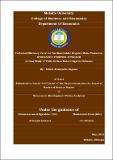| dc.contributor.author | Bekele, Alemayehu Regassa | |
| dc.date.accessioned | 2014-09-24T16:43:11Z | |
| dc.date.available | 2014-09-24T16:43:11Z | |
| dc.date.issued | 2013-05 | |
| dc.identifier.citation | Bekele Alemayehu Regassa (2013) Technical Efficiency Variation For Smallholder Irrigated Maize Producers:A Case Study of Tibila Surface Water Irrigation Scheme, Thesis. Mekelle:MU. | en_GB |
| dc.identifier.uri | https://opendocs.ids.ac.uk/opendocs/handle/20.500.12413/4505 | |
| dc.description.abstract | The Oromia regional Government has been making a great effort in transforming the abundant natural resource to promote and deliver agricultural technology packages and to increase efficiency of smallholder farmers with efficient utilizations of the existing scarce resource through agricultural-based infrastructures development. Huge irrigation schemes are being established accommodating large number of most needy segment of the society to bring about the desired economic transformation, food self-sufficient. Hence, the regional Government has been implementing many irrigation development projects on its big rivers for optimum benefit from it as well as harbinger of 'Agricultural led industrialization' for already established agro-processing units.
The main objective of the study was, therefore, to estimate technical efficiency variation and identify efficiency influencing variables in maize production for smallholder farmer supplemented in Tibila surface water Irrigation scheme found in two districts, namely, Sire and Jeju districts of Arsi zone of Oromia National Regional state. A stochastic frontier production model was used to estimate the levels of technical efficiency for randomly selected 113 irrigated maize producers and provides an empirical analysis of the determinants of inefficiency so as to search out the way to increase smallholders’ maize production and productivity.
The descriptive statistics revealed that the mean of maize yield per facasa (tsimadi) is 9.6 quintal which is lower than the plot level agronomic standard of the project i.e. 12 quintal. The classical test of one-sample mean-comparison test conducted for the production variables used in the estimation of stochastic production function indicates that they are not used at the plot level agronomic standard of the project. Technical efficiencies of irrigated maize smallholder farmers range from 0.54 to 0.98 with a mean of 0.916. The study finds that older age of household head, low levels of education for household heads, lack of credit services and limited livestock holding are found to have a positive effect on technical inefficiency. Providing irrigated maize producers with accurate and reliable information as to when they use factors of production, granting credit facility, strengthening households’ livestock ownership and livestock marketing system, improving educational level of farmers through necessary aids and reliefs are recommended for policy implications. | en_GB |
| dc.language.iso | en | en_GB |
| dc.publisher | Mekelle University | en_GB |
| dc.rights.uri | http://creativecommons.org/licenses/by-nc-nd/3.0/ | en_GB |
| dc.subject | Agriculture | en_GB |
| dc.title | Technical Efficiency Variation For Smallholder Irrigated Maize Producers:A Case Study of Tibila Surface Water Irrigation Scheme | en_GB |
| dc.type | Thesis | en_GB |
| dc.rights.holder | Mekelle University | en_GB |


